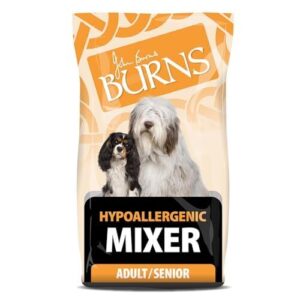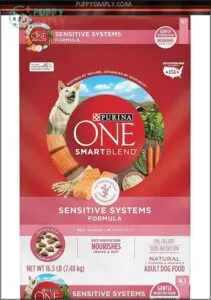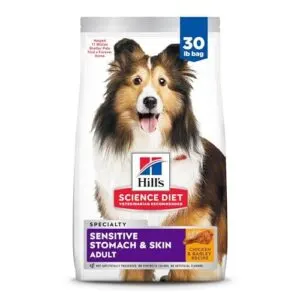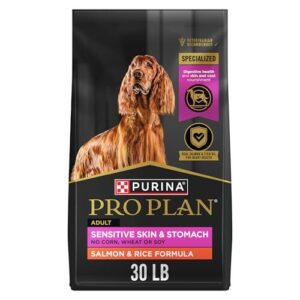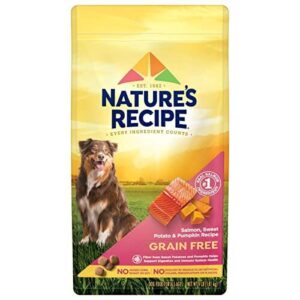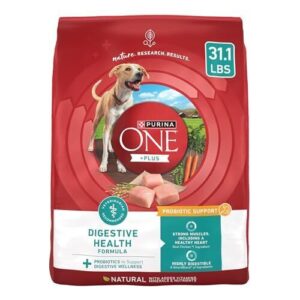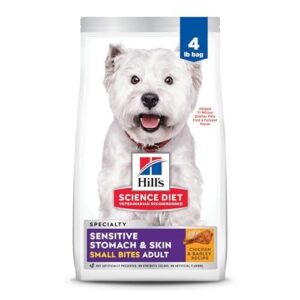This site is supported by our readers. We may earn a commission, at no cost to you, if you purchase through links.

Your dog’s digestive system hosts over 500 bacterial species, and when that delicate ecosystem falls out of balance, mealtimes become miserable for everyone involved. Chronic diarrhea, frequent vomiting, and painful gas aren’t just inconvenient—they signal that your dog’s gastrointestinal tract can’t properly process their current diet.
The right food changes everything: it calms inflammation, nourishes beneficial gut bacteria, and allows nutrients to absorb efficiently rather than passing through undigested.
Finding the best dog foods for sensitive stomachs means understanding which proteins your dog tolerates, how fiber affects motility, and why ingredient quality matters more than marketing claims. The formulas that deliver real results share specific characteristics that work with your dog’s digestive physiology, not against it.
Table Of Contents
- Key Takeaways
- Causes of Sensitive Stomachs in Dogs
- Signs Your Dog Has a Sensitive Stomach
- Key Ingredients for Sensitive Stomach Dog Food
- Top 7 Dog Foods for Sensitive Stomachs
- How to Switch Your Dog to Sensitive Stomach Food
- Frequently Asked Questions (FAQs)
- What is the best dog food for dogs with sensitive stomachs?
- How to choose dog food for sensitive stomachs?
- What is the best gastrointestinal dog food?
- What can I give my Dog if he has stomach problems?
- What food is best for dogs with sensitive stomachs?
- What is the best dog food for dogs that throw up?
- What ingredients should dogs avoid for a sensitive stomach?
- What dog food is best for an upset stomach?
- What are the most common symptoms of a sensitive stomach in dogs?
- Are there any dog breeds that are more prone to having a sensitive stomach?
- Conclusion
Key Takeaways
- Dogs with sensitive stomachs need food featuring single protein sources, limited ingredients (8-12 components), and easily digestible carbohydrates like white rice or sweet potato to minimize gastrointestinal stress and identify specific triggers.
- Probiotics and prebiotics work together to restore beneficial gut bacteria and support the microbiome, while avoiding artificial additives, high fat content (above 35% of daily calories), and common allergens like beef, chicken, dairy, and wheat prevents digestive upset.
- Successful food transitions require a gradual 10-14 day process starting with 25% new food mixed with 75% current diet, daily monitoring of stool consistency, and veterinary consultation to rule out underlying conditions like inflammatory bowel disease or pancreatitis.
- Top-performing sensitive stomach formulas share critical traits including real meat as the first ingredient, prebiotic fiber to fuel gut bacteria, omega-6 fatty acids for skin health, and zero fillers—ensuring every component serves a specific nutritional purpose.
Causes of Sensitive Stomachs in Dogs
Your dog’s sensitive stomach doesn’t happen by accident. A range of factors—from what you’re feeding to underlying health conditions—can trigger digestive upset and discomfort.
Food sensitivities often show up as chronic upset stomach, so switching to a specialized sensitive stomach dog food can help identify and eliminate problem ingredients.
Let’s look at the most common causes so you can identify what might be affecting your dog.
Sudden Diet Changes
Abruptly switching your dog’s diet disrupts gut flora, leading to gas, loose stools, and temporary digestive issues within 24 to 72 hours. The gastrointestinal system needs time to stabilize as enzymes adjust to new nutrient balance and metabolic shifts occur.
Abruptly switching your dog’s diet disrupts gut flora, causing gas and loose stools within 24 to 72 hours as enzymes adjust
- Energy levels may dip during the first week
- Gut health suffers when beneficial bacteria can’t adapt quickly
- Food intolerance symptoms often appear within days
- Limited ingredient diets require gradual dietary adjustments for success
Medical Issues and Chronic Conditions
While quick dietary shifts can shake things up, underlying medical issues often drive persistent gastrointestinal health problems in dogs. Inflammatory conditions like inflammatory bowel disease and colitis require ongoing pancreatitis management and specialized nutritional support. Chronic infections, including bacterial overgrowth and parasites, compromise intestinal wellness even when you’re feeding premium foods. These conditions demand veterinary diagnosis before any dietary intervention can truly restore canine digestive health.
| Condition Type | Common Examples | Impact on Digestion |
|---|---|---|
| Inflammatory Conditions | IBD, Colitis | Chronic inflammation reduces nutrient absorption, causes persistent diarrhea |
| Infectious Disease | Parvovirus, Giardia | Damages intestinal lining, triggers acute digestive issues |
| Pancreatic Disorders | Pancreatitis, Enzyme Deficiency | Impairs fat digestion, causes vomiting and discomfort |
| Structural Abnormalities | Congenital malformations | Disrupts normal gut motility and function |
Food Allergies and Intolerances
While chronic conditions require ongoing care, food allergies and food intolerance create different but equally challenging digestive issues in your dog. True food allergies trigger immune responses—hives, swelling, even anaphylaxis—whereas intolerances cause gastrointestinal health problems like gas and diarrhea without involving antibodies.
Allergy testing through your veterinarian helps identify triggers, enabling dietary adjustments that restore gut health and prevent nutrient deficiencies. Proper diagnosis separates immune-mediated allergies from enzyme-related intolerances, guiding effective treatment protocols.
- Beef, chicken, dairy, and eggs rank among the most common allergen sources in sensitive stomach cases
- Intolerance signs include chronic flatulence, mucus-filled stools, and persistent bloating after specific meals
- Proper diagnosis separates immune-mediated allergies from enzyme-related intolerances, guiding effective treatment protocols
Pet owners should familiarize themselves with food allergy and intolerance basics to better recognize symptoms and choose appropriate diets.
Ingredient Sensitivities
Beyond frank food allergies and food intolerance, your dog may experience ingredient sensitivities—reactions to specific compounds like fermentates, by-products, or certain protein sources that don’t trigger full immune responses but still cause digestive issues.
These dietary triggers can disrupt gut health even in dogs who previously tolerated similar foods, requiring careful elimination trials to identify which nutrient sensitivity underlies the sensitive stomach symptoms.
Learning about hidden ingredients in pet foods can also help pet owners identify possible sources of sensitivities.
High Fat or Low Fiber Diets
You’ll notice that fat content above 35 percent of daily calories can overwhelm your dog’s digestive enzymes and slow gastric emptying, while insufficient fiber from quality sources like oatmeal reduces stool bulk and disrupts gut microbiota balance.
Fat quality matters tremendously—unsaturated fats support digestion speed, whereas saturated varieties often trigger sensitive stomachs.
Always seek veterinary guidance and support when adjusting these nutritional parameters in dog food.
Signs Your Dog Has a Sensitive Stomach
Your dog’s digestive system speaks loudly when something isn’t right. Recognizing these warning signs early helps you address the problem before it becomes severe.
Watch for these common indicators that your dog’s stomach needs extra support.
If your pup is turning their nose up at mealtime, switching to one of the best dog foods for picky eaters with added omega-6s and antioxidants can help support both their digestion and overall health.
Vomiting and Diarrhea
Your dog’s occasional loose stools or post-meal vomiting may signal underlying gastrointestinal issues that need attention. When you notice these stomach upset patterns persisting, they often point to food intolerances or ingredient sensitivities affecting digestive health:
- Vomiting within 30 minutes of eating suggests digestive enzymes can’t break down certain proteins
- Watery diarrhea lasting beyond 24 hours indicates gut reactions requiring veterinary evaluation
- Mucus-coated stools reveal intestinal inflammation from vomiting triggers in sensitive stomach dog food
- Blood-tinged vomit or stool demands immediate medical assessment
- Frequent gut health disruptions signal chronic digestive system stress
Flatulence and Bloating
Excessive flatulence with foul odor indicates your dog’s digestive enzymes can’t properly break down proteins or fiber intake components. Gas production increases when gut bacteria ferment undigested food particles in sensitive stomach cases.
You’ll often observe visible bloating alongside the gas, where your dog’s abdomen appears distended or feels firm. These bloating causes stem from poor nutrient absorption, requiring specialized sensitive stomach dog food to support ideal gut health.
Changes in Appetite
When your dog suddenly turns picky or refuses meals they once enjoyed, hormone balance disruption often signals underlying digestion issues. Food intolerance and allergies alter appetite signals, making your dog hesitant about eating habits that previously caused discomfort.
You’ll notice these food preferences shift as their body tries protecting itself from ingredients compromising nutrient absorption, requiring sensitive stomach dog food to restore ideal gut health.
Stool Consistency and Frequency
Healthy dogs typically produce one to two bowel movements per day with firm, well-formed stools that score three to five on the Bristol scale.
When you see loose stools, mucus, or shifts from type two to type six over two days, fiber intake and water absorption problems often point to sensitive stomach issues requiring specialized dog food.
Consistent gut balance aids ideal stool quality and gastrointestinal health.
Key Ingredients for Sensitive Stomach Dog Food
When you’re shopping for dog food to soothe a sensitive stomach, the ingredient list tells you everything you need to know. The right components work together to calm inflammation, support digestion, and eliminate common triggers that upset your dog’s gut.
Here’s what to look for—and what to avoid—when reading those labels.
Single Protein Sources
When you’re managing protein allergies in your dog, a single protein source becomes your strongest diagnostic tool. These formulas contain just one animal protein—chicken, salmon, or lamb—which simplifies canine nutrition and aids gut health while minimizing digestive ease disruptions.
If your dog struggles with digestion issues, single source dog food helps you identify triggers and provides targeted relief for sensitive stomach concerns.
Limited Ingredient Formulas
Beyond choosing a single protein source, limited ingredient formulas take allergen avoidance one step further by restricting the entire recipe to 8 to 12 carefully selected components. You’ll find one main protein paired with one carbohydrate source, minimizing exposure to potential triggers while maintaining nutrient balance.
These simplified dog foods offer ingredient clarity that aids digestion and gut health, making it easier to pinpoint sensitivities affecting your dog’s sensitive stomach.
Easily Digestible Carbohydrates
After narrowing down ingredients, you’ll want carbohydrates that your dog’s digestive system can break down quickly. White rice, sweet potato, and oatmeal serve as ideal starch sources because they’re absorbed efficiently without stressing the gut.
These options feature low fiber content and moderate glycemic impact, reducing digestion issues while supporting gut health when your dog faces dietary restrictions or persistent stomach upset.
Probiotics and Prebiotics
You’ll also want to support gut health through live beneficial bacteria and the fibers that feed them. Probiotics like Lactobacillus strains colonize your dog’s digestive tract, improving microbiome balance and stool quality, while prebiotic fibers such as chicory root nourish these friendly bacteria.
Together, this synbiotic combination enhances gastrointestinal health and wellness, helping manage your dog’s sensitive stomach more effectively.
Ingredients to Avoid
Just as important as what you add is what you leave out. Artificial additives like BHA, BHT, and synthetic food preservatives can irritate the stomach lining and worsen digestion issues in dogs prone to gastrointestinal upset.
High sodium content, unbalanced fatty acids, and toxic fillers such as corn syrup or unnamed byproducts may trigger food allergies and intolerances, compromising your dog’s gastrointestinal health and wellness.
Top 7 Dog Foods for Sensitive Stomachs
Choosing the right food for your dog’s sensitive stomach requires balancing digestibility, ingredient quality, and nutritional completeness.
The seven options below represent formulas that prioritize gentle proteins, limited ingredients, and digestive support through probiotics or easily processed carbohydrates.
Each manages common sensitivities while maintaining the nutrient density your dog needs to thrive.
1. Burns Hypoallergenic Dog Food Mixer
Burns Hypoallergenic Dog Food Mixer is a rice-based complementary feed designed to be gentle on reactive digestive systems. The formula consists of 75 percent brown rice, providing steady energy from a wholegrain source, while oats and peas enhance digestibility and fiber.
This mixer excludes common irritants such as beef, wheat, soy, and dairy, making it ideal for dogs with sensitivities. It is intended to pair with Burns wet foods or home-cooked meals, offering flexibility while maintaining digestive comfort.
The 2 kg bag format supports consistent feeding routines, ensuring your dog’s stomach remains settled.
| Best For | Dog owners looking for a gentle, rice-based mixer to support pets with food sensitivities, allergies, or reactive digestive systems. |
|---|---|
| Primary Ingredient | Rice |
| Form | Raw |
| Age Range | All Ages |
| Weight | 2 kg |
| Digestive Support | Yes |
| Skin & Coat | Yes |
| Additional Features |
|
- Hypoallergenic formula free from common irritants like beef, wheat, soy, and dairy
- Rice-based blend with oats and peas for easy digestion and steady energy
- Flexible use as a mixer with wet food or home-cooked meals
- Biscuit size may be too large for small or senior dogs with dental issues
- Higher price point compared to standard dog food mixers
- May require trial and adjustment to find the right feeding amount for your dog
2. Purina One Sensitive Stomach Dog Food
Purina One Sensitive Stomach uses real salmon or turkey as the first ingredient, delivering high-quality protein your dog’s system can absorb without stress. The formula pairs rice and oatmeal as gentle carbohydrate sources, reducing digestive upset while maintaining energy levels.
It includes a dual antioxidant blend to support immune function alongside omega-6 fatty acids for skin and coat health. With 0% fillers, every component fulfills a nutritional purpose.
This widely available kibble offers moderate protein and controlled fat levels, supporting regular stool formation in dogs prone to digestive issues.
| Best For | Dog owners seeking a widely available formula that combines real salmon protein with gentle grains to support digestive health in dogs with sensitive stomachs. |
|---|---|
| Primary Ingredient | Salmon |
| Form | Dry |
| Age Range | Adult |
| Weight | 16.5 lb |
| Digestive Support | Yes |
| Skin & Coat | Yes |
| Additional Features |
|
- Real salmon as the first ingredient provides easily digestible protein without common irritants
- Rice and oatmeal carbohydrate blend supports steady digestion and regular stool formation
- Zero fillers means every ingredient serves a nutritional purpose, with added antioxidants and omega-6s for immune and coat health
- Contains chicken by-product meal and beef fat, which some owners prefer to avoid
- May not work for dogs with specific allergies to poultry or beef ingredients
- Higher price point compared to basic dog food options
3. Hill’s Sensitive Stomach Dog Food
Hill’s Sensitive Stomach Dog Food combines chicken as the primary protein with prebiotic fiber to fuel beneficial gut bacteria and support a balanced microbiome. The highly digestible ingredients support nutrient absorption while producing well-formed stools, simplifying cleanup.
You’ll find omega-6 fatty acids and vitamin E working together to promote healthy skin and a shiny coat, addressing both digestive and dermal sensitivities.
As the number-one veterinarian-recommended brand, Hill’s delivers precise nutritional balance in kibble sized appropriately for adult dogs with sensitive digestion.
| Best For | Adult dogs (1-6 years) with sensitive stomachs or skin issues who need veterinarian-trusted nutrition with prebiotic support. |
|---|---|
| Primary Ingredient | Chicken |
| Form | Dry |
| Age Range | Adult 1-6 |
| Weight | 30 lb |
| Digestive Support | Yes |
| Skin & Coat | Yes |
| Additional Features |
|
- Prebiotic fiber promotes healthy digestion and easier cleanup with well-formed stools
- Omega-6s and vitamin E support both skin health and coat shine
- Number-one veterinarian-recommended brand with precisely balanced nutrition
- Higher price point, especially for owners of larger dogs
- Some dogs need an adjustment period to transition to the food
- Pricing and availability can vary by region
4. Purina Pro Plan Sensitive Skin Dog Food
Real salmon is the first ingredient in Purina Pro Plan Sensitive Skin and Stomach formulas, delivering approximately 26 percent protein to support your dog’s digestion without overwhelming the gut. Oatmeal serves as the primary carbohydrate, providing gentle, easily digestible energy alongside prebiotic fiber to balance intestinal flora.
Live probiotics fortify digestive and immune health, while omega-6 fatty acids from sunflower oil nourish skin and coat. The formula excludes corn, wheat, and soy—common triggers for sensitive dogs.
| Best For | Dogs with sensitive stomachs or skin issues who need a high-protein diet that’s easy to digest and helps reduce itching and irritation. |
|---|---|
| Primary Ingredient | Chicken |
| Form | Dry |
| Age Range | Adult 1-6 |
| Weight | 15.5 lb |
| Digestive Support | Yes |
| Skin & Coat | Yes |
| Additional Features |
|
- Real salmon as the first ingredient provides quality protein without common allergens like corn, wheat, or soy
- Live probiotics support gut health and immune function while oatmeal offers gentle, easily digestible fiber
- Omega-6 fatty acids from sunflower oil help maintain healthy skin and coat
- Higher price point compared to standard dog food brands
- Some customers have reported quality control issues including bugs in the food
- May not work for dogs with severe allergies or multiple food intolerances
5. Nature’s Recipe Grain Free Dog Food
When grains upset your dog’s stomach, Nature’s Recipe Grain Free offers a thoughtfully formulated alternative. Real chicken or salmon leads the ingredient list, paired with sweet potato and pumpkin to deliver digestible carbohydrates without corn, wheat, or soy.
Probiotics and prebiotics like chicory root help balance intestinal flora, while moderate fiber aids stool formation without causing bulkiness.
You’ll find natural antioxidants aiding immune function, and essential fatty acids targeting skin health—especially valuable if your dog experiences both digestive sensitivity and itching.
| Best For | Dogs with grain sensitivities or allergies who need a simple, easily digestible protein source with ingredients that support both gut health and skin conditions. |
|---|---|
| Primary Ingredient | Salmon |
| Form | Dry |
| Age Range | Adult |
| Weight | 30 lb |
| Digestive Support | Yes |
| Skin & Coat | Yes |
| Additional Features |
|
- Real salmon as the first ingredient provides high-quality protein and omega fatty acids for skin and coat health
- Sweet potatoes and pumpkin offer gentle, digestible carbohydrates that support regular digestion
- Free from common irritants like corn, wheat, soy, and artificial additives that can trigger sensitivities
- Some ingredients may be processed at high temperatures, which can reduce their nutritional value
- May not work for dogs with very specific dietary restrictions or those needing specialized nutrition
- Freshness and quality can vary depending on how the bag was stored before purchase
6. Purina One Digestive Health Dog Food
When digestive upset becomes a pattern, targeted probiotic support can make the difference. Purina ONE Digestive Health combines real chicken—your dog’s first ingredient—with live cultures that help restore healthy gut flora and improve nutrient absorption.
You’ll see 25 percent minimum crude protein supporting lean muscle, while limited fiber (3 percent maximum) promotes consistent stool quality without irritation. Omega-6 fatty acids nourish skin alongside digestion, and antioxidants like vitamin E strengthen immune resilience while the gastrointestinal system heals.
| Best For | Dogs with sensitive stomachs or recurring digestive issues who need gentle, probiotic-rich nutrition to support gut health. |
|---|---|
| Primary Ingredient | Salmon |
| Form | Kibble |
| Age Range | Adult |
| Weight | 31.1 lb |
| Digestive Support | Yes |
| Skin & Coat | Yes |
| Additional Features |
|
- Real chicken as the first ingredient delivers high-quality protein (25% minimum) for lean muscle maintenance
- Live probiotics and highly digestible formula work together to restore healthy gut bacteria and improve nutrient absorption
- Omega-6 fatty acids and antioxidants provide dual benefits for skin health and immune support during digestive recovery
- Higher price point compared to standard dog food brands
- Some customers reported shipping and delivery problems with their orders
- May not work for dogs with specific dietary restrictions or food sensitivities beyond general digestive concerns
7. Hills Science Diet Sensitive Stomach Dog Food
When your dog’s digestive troubles persist, you need a formula built on decades of veterinary research. Hill’s Science Diet Sensitive Stomach & Skin features chicken and chicken meal as highly digestible protein sources, paired with cracked pearled barley for gentle energy delivery.
Prebiotic fiber from beet pulp nourishes beneficial gut bacteria to support a balanced microbiome, while omega-6 fatty acids and vitamin E target both coat health and skin barrier function.
At approximately 370 kilocalories per cup, this U.S.
-manufactured kibble delivers clinical-grade digestive support without compromising nutritional completeness.
| Best For | Dogs with sensitive stomachs or skin issues who need veterinarian-backed nutrition to reduce digestive upset and improve coat health. |
|---|---|
| Primary Ingredient | Salmon |
| Form | Dry |
| Age Range | All Stages |
| Weight | 4 lb |
| Digestive Support | Yes |
| Skin & Coat | Yes |
| Additional Features |
|
- Prebiotic fiber supports gut health and helps maintain a balanced microbiome
- Omega-6 fatty acids and vitamin E work together to promote healthy skin and a shiny coat
- Highly digestible chicken-based formula reduces stomach upset and messy clean-ups
- Higher price point compared to many standard dog food brands
- May require a gradual transition period to avoid initial digestive issues
- Not formulated for severe food allergies or as a replacement for prescription diets
How to Switch Your Dog to Sensitive Stomach Food
Switching to a sensitive stomach formula requires patience and careful attention to your dog’s digestive response. The shift process involves more than simply swapping out food—you’ll need to monitor stool consistency, adjust feeding amounts, and support your dog’s gut health throughout the change.
Here’s how to make the switch safely and effectively.
Transitioning Gradually and Monitoring
When switching to a sensitive stomach dog food, a gradual shift over 10 to 14 days protects your dog’s digestive health. Start by mixing 25 percent new food with 75 percent current diet, then increase the new portion every 3 to 4 days.
Monitor stool consistency daily using a 1 to 5 scale and track appetite changes to catch potential digestion issues early.
Consulting Your Veterinarian
Before changing your dog’s food, schedule a veterinary care appointment to rule out underlying conditions like inflammatory bowel disease or pancreatitis.
Your vet will recommend diagnostic tests—blood work, stool analysis, or imaging—to pinpoint the cause of your dog’s sensitive stomach. They’ll create nutrition plans customized to your dog’s specific needs and suggest treatment options that support long-term health monitoring and digestive stability.
Adjusting Portions and Feeding Schedule
Once your vet gives the green light, portion control becomes your next priority for dietary management. Divide your dog’s daily food into two to four smaller meals to ease digestion issues and prevent overeating.
Use a kitchen scale to measure accurately, and keep meal timing consistent—this regulates metabolism, maintains nutrient balance, and helps maintain digestive health in dogs with sensitive stomachs.
Supporting Gut Health During Transition
Stability in your dog’s gut microbiome depends on targeted probiotic therapy during every dietary shift. You’ll preserve gastrointestinal health and wellness by supporting digestion issues with proven change strategies:
- Add veterinarian-approved Lactobacillus or Bifidobacterium strains to maintain nutrient balance
- Increase dietary fiber gradually—2 to 4 grams per 100 calories—to regulate stool consistency
- Monitor for gas or bloating within 24 to 72 hours after introducing probiotics for sensitive stomach management
Frequently Asked Questions (FAQs)
What is the best dog food for dogs with sensitive stomachs?
The best dog food for sensitive stomach issues features single protein sources, limited ingredients, and probiotics to support gut health. Look for easily digestible carbohydrates and avoid common allergens.
How to choose dog food for sensitive stomachs?
Ironically, you can’t trust labels alone when shopping for sensitive stomach diets.
Read ingredient panels for single proteins, avoid beef byproducts and corn, then check for probiotics with guaranteed colony counts before choosing.
What is the best gastrointestinal dog food?
Formulas designed for gastrointestinal health and wellness feature easily digestible proteins, probiotics, and prebiotic fibers.
Look for limited ingredient options with balanced fat content, avoiding corn, wheat, and artificial additives that irritate sensitive stomachs.
What can I give my Dog if he has stomach problems?
When your dog faces digestion issues, start with gentle carbs like white rice and lean protein, then add probiotics. Hydration support matters most—consult your vet to address gastrointestinal health before choosing sensitive stomach dog food.
What food is best for dogs with sensitive stomachs?
Single-protein formulas with limited ingredients support gut health and minimize food allergens. Look for easily digestible carbohydrates, probiotics, and balanced nutrients while avoiding high-fat content for effective sensitive stomach management.
What is the best dog food for dogs that throw up?
When vomiting strikes, limited ingredient formulas with single protein sources and digestive enzymes calm the gut.
Stomach soothers like probiotics restore balance—consult veterinary care and advice to rule out serious digestion issues.
What ingredients should dogs avoid for a sensitive stomach?
You’ll want to steer clear of artificial additives like BHA and BHT, common fillers such as corn and soy, meat byproducts, high fat ingredients, and dairy products—all common triggers for digestion issues.
What dog food is best for an upset stomach?
Nothing soothes intestinal upset faster than a limited ingredient formula featuring easily digestible proteins like turkey, paired with white rice and probiotics to restore gastrointestinal health and wellness while calming digestive issues.
What are the most common symptoms of a sensitive stomach in dogs?
The most telltale digestive issues include repetitive vomiting after meals, loose or watery stools, excessive flatulence with abdominal bloating, and sudden appetite changes that persist beyond a single day.
Are there any dog breeds that are more prone to having a sensitive stomach?
Like a genetic lottery, some dogs inherit digestive challenges. Yorkshire Terriers, Miniature Schnauzers, German Shepherds, Boxers, and Shih Tzus frequently show breed-specific issues with gut health management requiring specialized sensitive stomach dog food and dietary restrictions.
Conclusion
Your dog’s digestive relief often arrives when you least expect it—not through expensive specialty formulas, but by matching their unique sensitivities to the right ingredients.
The best dog foods for sensitive stomachs share non-negotiable traits: single proteins, digestible carbohydrates, and probiotics that restore bacterial balance.
Start your shift gradually, watch stool consistency closely, and consult your veterinarian if symptoms persist beyond two weeks. Your dog’s gut health deserves this precision.
- https://dogfoodadvisor.com/dog-food-reviews/we-feed-raw/
- https://maevinc.sjv.io/GKO3k9
- http://www.merckvetmanual.com/mvm/management_and_nutrition/nutrition_small_animals/nutritional_requirements_and_related_diseases_of_small_animals.html
- http://www.acvn.org/
- https://secure.balanceit.com/recipegenerator_ver4/index.php?



